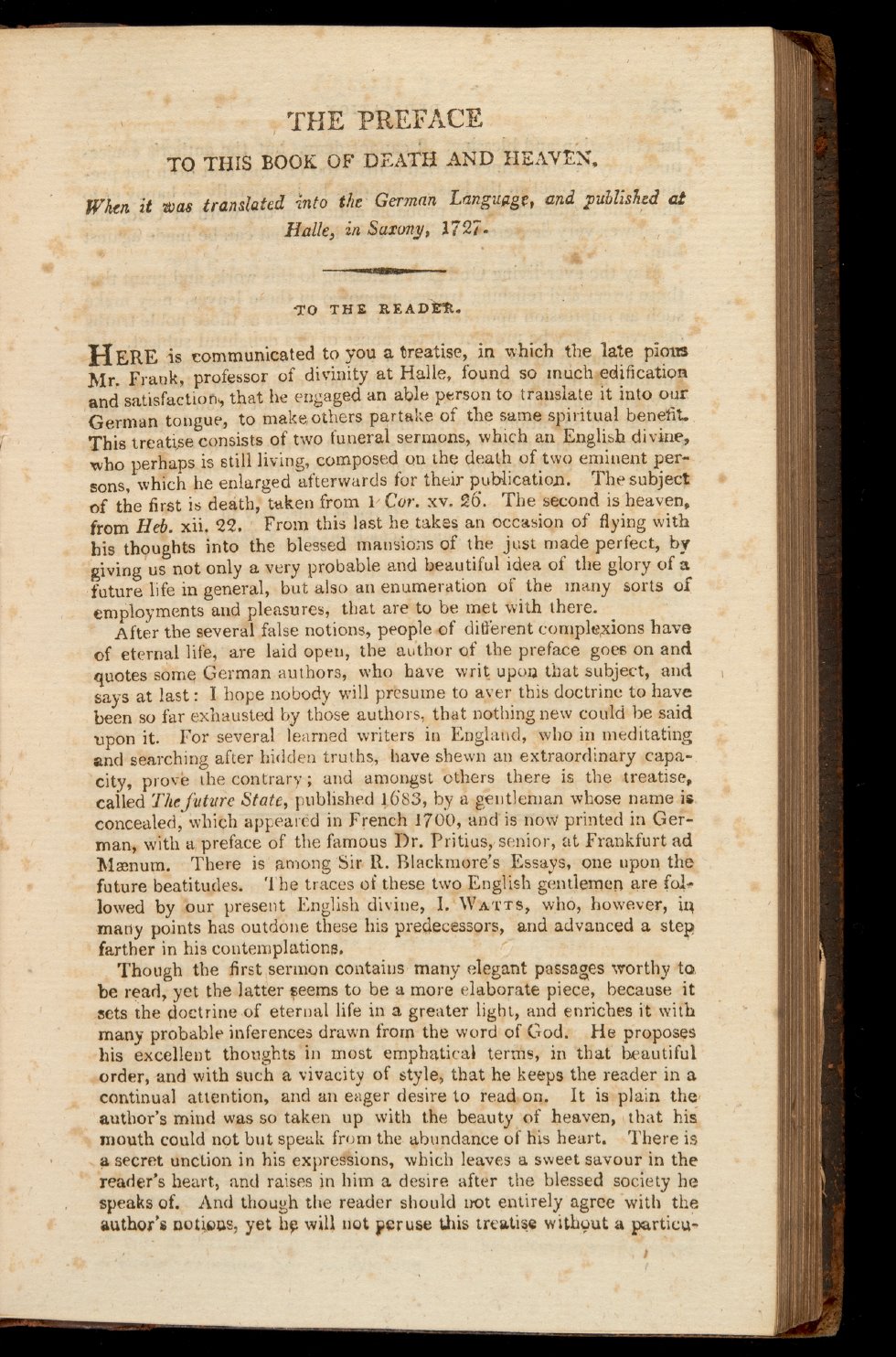

THE
PREFACE
TO
THIS
BOOK
OF
DEATH AND HEAVEN.
When
it
was
translated
into
the German
Language, and
published
at
Halle,
in Saxony,
1727.
TO
THE
READEit.
HERE
is
communicated to
you
a
treatise, in
which
the
late
pions
Mr. Frank,
professor of divinity
at
Halle,
found
so
much edification
and satisfactions
that
be
engaged an able
person
to
translate it
into
our
German
tongue, to make,others
partake
of the same
spiritual
benefit.
This treatise
consists
of
two
funeral serinons,
which
an English divine,
who perhaps
is
still
living, composed on
the death of
two
eminent
per-
sons, which
he enlarged
afterwards
for
their
publication. The
subject
of
the first
is
death, taken
from
1,
Cor. xv.
26.
The
second
is
heaven,
from
Heb.
xii.
22.
From this last he takes an occasion
of
flying
with
his thoughts
into
the blessed mansions of the
just
made
perfect,
by
giving
us
not
only
a
very
probable and beautiful idea
of
the glory of
a
future
life
in
general,
but
also
an
enumeration of the
many sorts
of
employments
and
pleasures,
that
are
to
be met with
there.
After the several
false
notions, people of different complexions
have
of eternal
life,
are
laid
open, the
author of
the preface
goes
on
and
quotes
some
German
authors,
who
have writ
upon
that
subject, and
says
at
last
:
I
hope
nobody will
presume
to
aver this doctrine
to
have
been
so
far exhausted
by
those
authors,
that
nothing
new
could he said
upon
it.
For several learned writers
in
England,
who
in
meditating
and searching after hidden
truths,
have
shewn an
extraordinary capa-
city, prové the contrary
;
and amongst
others there
is
the treatise,
called
Thefuture State,
published 1683,
by
a gentleman
whose
name
is
concealed,
which
appeared
in
French
1700,
and
is
now
printed
in
Ger-
man,
with
a,
preface of the famous I3r.
Pritius,
senior,
at
Frankfurt ad
Mmnum.
There
is
among
Sir
R.
ßlackmoré
s
Essays, one
upon.
the
future
beatitudes.
The traces
of
these
two
English gentlemen
are
fol=
lowed
by
our
present
English
divine, I.
WATTS, who,
however, in
many points
has
outdone
these his predecessors, and
advanced
a
step
farther
in
his
contemplations.
Though the first sermon contains many elegant
passages
worthy
to.
be read, yet
the
latter
Teems
to be
a
more
elaborate
piece, because
it
sets
the
doctrine of eternal
life
in
a
greater
light, and enriches
it
with
many
probable
inferences drawn from
the
word of God.
He
proposes
his
excellent thoughts
in
most emphatical terms,
in
that
beautiful
order,
and
with such
a
vivacity
of style,
that
he keeps
the reader
in
a
continual
attention,
and an
eager desire to read
on.
It
is
plain the,
author's
mind
was so
taken
up with the
beauty of heaven,
that
his
mouth
could
not but
speak from the abundance of
his
heart. There
is
á secret unction
in his
expre4sions, which
leaves a sweet
savour
in
the
reader's heart,
and raises in him
a
desire
after
the
blessed society
he
speaks
of.
And though
the reader should
trot
entirely
agree with
the
author's
notions,
yet
by
will
not
peruse
this treatise
without a
portico.-

















